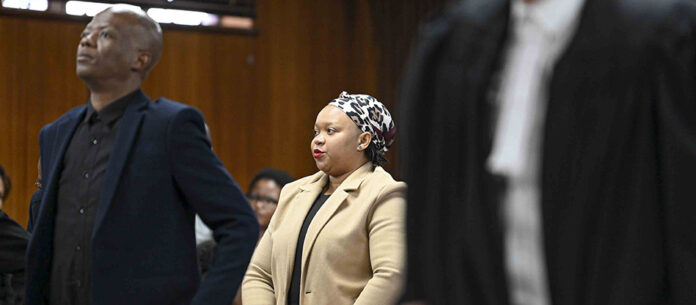Ace Magashule’s ex-PA Moroadi Cholota has taken the National Prosecuting Authority (NPA) head-on in the Constitutional Court, arguing that her extradition to the US was not just a mistake but a violation of the law – one that strikes at the very heart of justice, the Constitution and the rule of law.
Cholota’s fightback against the prosecution’s appeal to the high court judgment in June, setting her free from the Free State R255-million asbestos tender scandal, is contained in an answering affidavit filed on Thursday.
She focuses on the precedent known as the “Schultz Judgment”, handed down by the Supreme Court of Appeal (SCA) in May 2024, saying it changed everything about how extraditions are supposed to work.
The ruling responded to the critical question: Who in South Africa has the legitimate power to request that someone be handed over to another country?
Cholota’s answer is blunt: “There is no law in existence that empowers the NPA to make or request the extradition of fugitives from other countries. Such a law has never been in force or operation …”
For years, it seemed the NPA could act on behalf of the state to request extraditions. But the Schultz Judgment came along and changed that. The SCA ruled that only the minister of justice can formally request extraditions. Anything else, the court said, is unlawful.
Cholota argues that when the SCA handed down its decision in the Schultz case, it became the law of the land, binding on everyone, from government officials to lower courts.
“It became applicable to all extraditions from that point in time, pending and future.”
She says it meant that, from that moment on, extradition request had to come from the minister.
Cholota says she was sitting in a jail cell, awaiting her extradition hearing, when the SCA handed down the Schultz Judgment. Importantly, the American authorities were still talking to the SA government, gathering information for her upcoming extradition hearing.
Cholota says the NPA knew about the new judgment, knew the law had changed and knew it was its duty to inform the US.
“The NPA could have, and should have, informed US officials that a Supreme Court of Appeal judgement… now stipulated that extradition requests were to be made by the minister of justice,” she argues.
But that did not happen. Instead, the NPA stayed silent. It did not send the paperwork to the minister for approval.
Cholota wrote: “At no point within those six months was the extradition ever ratified or sent to the minister of justice for approval.”
Cholota claims she raised this issue with the Constitutional Court before her extradition hearing even began. “The lack of ministerial approval and unlawfulness of the extradition request were highlighted in the direct access application I brought before this court, launched on 3 June 2024,” she says.
The state, she says, wants to downplay the error, calling it a mere technicality. Cholota disagrees. She believes it’s a fundamental breach of the law.
According to her, state documents sent to the US contained “material fabrications and false representations”. She points to court records where two state witnesses, under oath, admitted to several damning facts, including that the state charged her for offences the US had not approved during the extradition.
Also, a claim that she was a flight risk with Kenyan connections was false, and the investigating officer acted against her after she refused to implicate Magashule.
Cholota says, “The state was aware that it was required to prove beyond a reasonable doubt that the extradition was lawful but failed.”
“My extradition was unlawful, whether one had regard to the contents of the affidavits submitted by the state prosecutor or regard to the fact that the extradition request was not made by the minister of justice…”
Her arguments struck a chord with Judge Phillip Loubser in the Bloemfontein High Court in June, who wrote in his judgment: “If something was done unlawfully in the extradition process, that wrong can never be cured by a failure to plead the same in the special plea.
After all, it was at least pleaded that the extradition was unlawful.”



